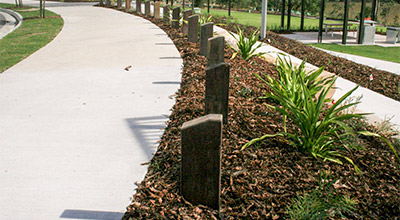Bollards › Park Environment Use
The market for mass park bollards will always be subject to high levels of competition from low-grade timber substitutions and to price sensitivity.
While Outdoor Structures Australia has generic products in this category, we also produce park bollards that are unique in the market and are specific to OSA. This reflects our approach to our client’s market focused on quality design that is above the lowest common dominator pricing.
Park Bollard requirements
- To enliven the expanse of space
- To encourage engagement
- To encourage a sense of play
- Expanses of rail-less boundary fencing (typically this is a non-intrusive bollard).
There are two (2) main forms of bollards for park environments: ‘Mass’ and ‘Feature’.
‘Mass’ bollards
These often function as fencing without rails. Due to the large expanses of bollards required they tend to be:
- Simple;
- Inexpensive;
- Smaller in size.
Fabrication from FCDD has the advantage of removing the bollard from the mass market and offering additional benefits of lifespan, lower maintenance and limiting the ability of competitors /installers to substitute with cheaper products.
Moreover, there is the ability to use negative cut pieces in production of a composite timber and FCDD bollard, to further enhance the bollard range in a price competitive manner.
Given the long runs of bollards that traverse the park landscape there is the opportunity to design for ‘mass effect’ as an experience rather that the individual item as a sculpture.
‘Feature’ bollards
These are located at points of entry, street intersections or activity centres.
They tend to be:
- Taller than mass bollards;
- Of increased mass;
- Demarcations for entry points or a change in conditions.
Presently, park bollards are in many ways conceptually closer to fencing - purely functional barriers that offer little to the space or the activities that occur there.
However, given park environments are primarily recreational and dominated by children; the rationale exists for feature bollards to be fun or engage the passerby/user (who is open to the perception of messages given the environment).
Noting the simplicity of the park landscape, design trends generally focus on primarily simple forms. Detail is applied with banding or capping that forms the proprietary controllable item.
Options for detailing include:
- Leaf forms;
- Words;
- Places;
- Grass bases;
- Wave lines;
- Bands;
- Capping and base features.
Please contact OSA with any questions on our park bollard range.



